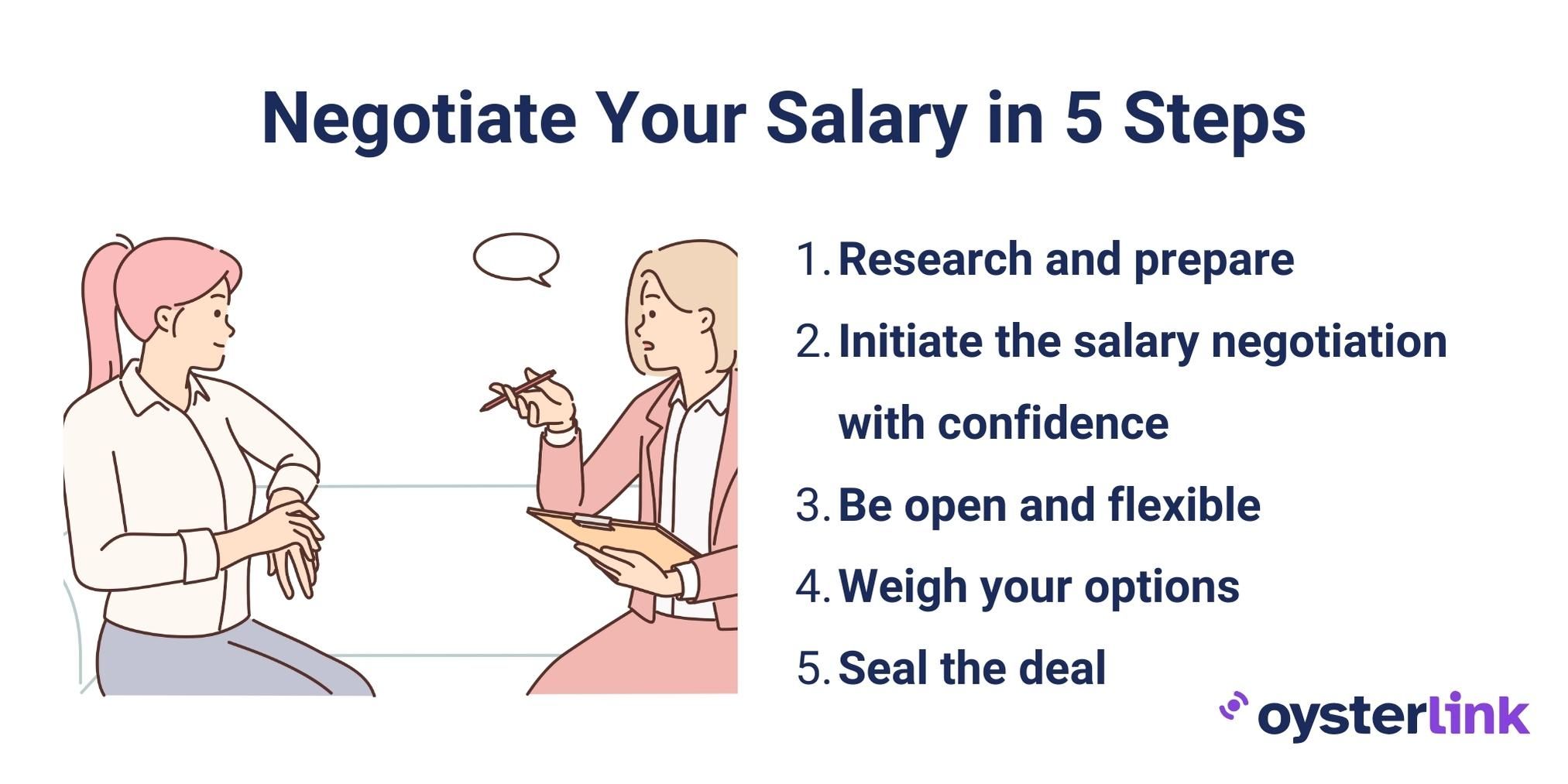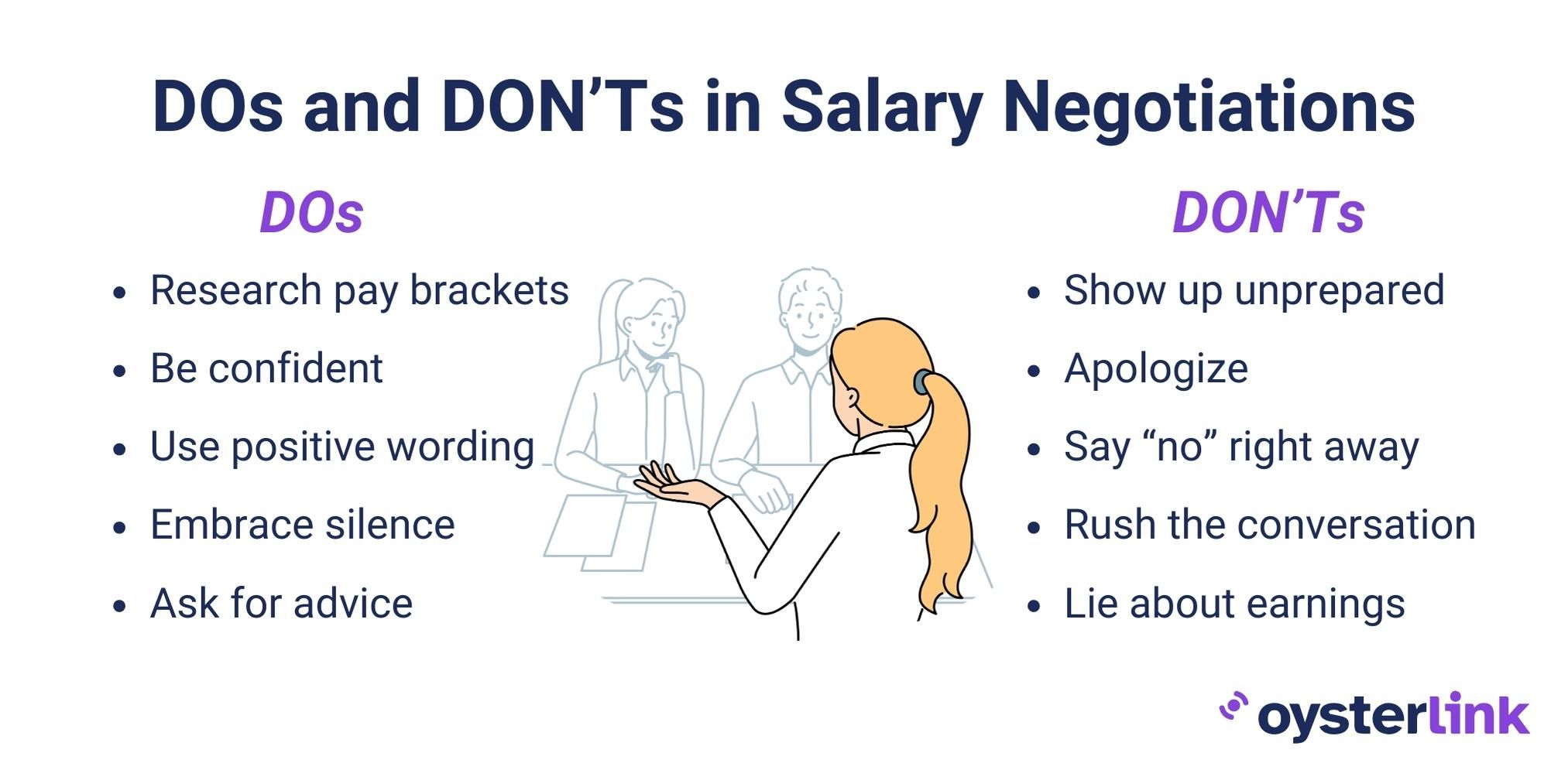How To Negotiate Salary: 3 Key Takeaways
- 84% of employers expect you to negotiate, and 87% say it won’t hurt your chances—so ask for what you’re worth.
- Back your ask with research, a clear number, and key benefits. OysterLink’s paycheck calculator makes take-home pay easy to estimate.
- If salary is fixed, aim for perks: think 3 extra PTO days, 2 WFH days, or a $1,000 training stipend to close the gap.
How to negotiate salary is a key skill that helps you earn more and feel confident about your next career move.
By approaching the process with preparation, confidence, and flexibility, you can secure a compensation package that reflects your true value.
How To Negotiate Salary in 5 Steps
Negotiating your salary can be as difficult as asking about your pay in an interview — but it’s not impossible.
In fact, it’s a skill you need to learn if you want to maximize your earning potential.
The video below covers some of the steps we’ll list below, plus provides additional advice that you may find beneficial when negotiating the initial offer.
The following five steps will help you navigate the intricacies of salary negotiation after getting that initial job offer with a higher level of success.
1. Research and Prepare
Start by digging into the specifics. Research industry standards, the company’s salary practices and average pay for your role in your area.
One way to do this is to browse through job openings and salary trends in your area for the same role.
Alternatively, ask around through friends or acquaintances working in the same industry.
Now that you have a good understanding of the usual pay for your role, it’s time to look inward.
Review what you have to offer and consider the following:
- Your experience
- Your skills and qualifications
- Your current or previous salary
If you have impressive credentials or a standout track record in any of these areas, use them to your advantage during negotiations.
These strengths will be your key assets in securing the compensation package that reflects your true worth.
Even if you don’t have what you consider “impressive” credentials in these areas, recognize your own value.
Everyone brings something unique to the table.
Think about how your experiences and skills have contributed positively to your career and your potential contributions to the company.
Emphasize your enthusiasm, willingness to learn and dedication to the role.
Then, settle on a specific figure: Before you finalize that number, keep in mind that it’s essential to consider tax deductions.
Your net income after taxes is what truly matters.
OysterLink’s paycheck calculator automatically provides an estimate of your take-home pay, factoring in all relevant tax deductions.
This tool should simplify the process for you and help you determine a practical and tax-smart compensation package.
Lastly, keep in mind that it’s not only about the money.
Consider the complete compensation package, which may include benefits and perks like paid time off (PTO), a 401(k) plan, employee discounts and career advancement.
These elements are integral to your overall job satisfaction and should also factor into your negotiation strategy.
These elements are integral to your overall job satisfaction and should also factor into your negotiation strategy.
2. Initiate the Salary Negotiation With Confidence
So you finally have a number in mind. Now, it’s time to let your potential employer know about it.
First, you’d be happy to know that a survey found that 84% of employers always expect applicants to negotiate their salary.
Additionally, a whopping 87% said that negotiating never affected the applicants’ chances of getting the job.
This goes to show that you shouldn’t hesitate to negotiate your salary after a job offer.
Kick off the conversation professionally by making sure you approach your potential employer with clarity and respect.
How to negotiate salary after the offer via email
Here’s an example script on how to negotiate salary after the offer email:
*Subject: Salary Discussion for [Job Title] Position – [Name]
Dear [Hiring Manager’s Name],
Thank you for extending the opportunity to join [Company Name] as a [Job Title].
I am excited about the role and the potential to contribute to the team.
After researching industry standards and considering my experience in [specific skills or achievements], I would like to discuss a possible adjustment to the starting salary.
Based on market rates in [Your Area], I believe a salary of [Desired Salary] would more accurately reflect my expertise and the value I hope to bring to the team.
I also value the benefits offered by [Company Name] and would be open to discussing the full package.
Please feel free to respond to this email or reach me directly at [Phone Number].
Thank you for considering my request.
I look forward to the possibility of finalizing an agreement that reflects a mutual benefit.
Best regards,
[Your Full Name]
Here’s another example:
*Subject: Salary Discussion for [Job Title] Position – [Name]
Dear [Hiring Manager’s Name or HR Representative’s Name],
I am thrilled about the opportunity to join [Company Name] as a [Job Title].
I have carefully reviewed the offer and I’d like to discuss the compensation package.
Considering my experience and industry standards, I propose a salary adjustment to [Your Desired Salary].
This aligns with market rates in [Your Area] and reflects my commitment to delivering top-notch results.
I also value [Company Name]’s benefits and culture.
Could we discuss other aspects of the compensation package, such as [mention specific benefits or perks you’d like to negotiate]?
Feel free to reply to this email or you can reach me directly at [Phone Number].
I’m eager to contribute to [Company Name]’s success and look forward to finding a mutually beneficial solution.
Thank you for your understanding and consideration.
Best regards,
[Your Full Name]
*Alternatively, you can simply reply to the same thread as the job offer email.
This email works well because it strikes a friendly and professional tone while clearly stating your intention to talk about compensation.
It shows that you know what you’re talking about and that you’re open to chatting about other parts of the compensation package.
Your positive energy and clear approach make conversation easy, and sharing contact details helps keep the discussion going smoothly.
While we’re here, here’s a reminder: have everything in writing — from your negotiating salary email to subsequent counteroffers and final confirmation.
If you’re having the discussion in an in-person interview, kindly ask them to send you an email with the updated terms.
This practice ensures clarity and avoids potential misunderstandings as you navigate the negotiation process.
How to negotiate your salary offer letter in person
If the negotiation talks are happening during an in-person interview, here’s what you can say to make a strong case as to why the salary needs to be renegotiated:
"Thank you for the offer. I’m genuinely excited about joining [Company Name] as a [Job Title].
However, based on my experience in [mention relevant areas] and the market rate, I was hoping we could look at adjusting the starting salary to $[Desired Salary].
I believe this figure better reflects my skills and what I can bring to the team. I’d also be happy to discuss other parts of the package if there’s flexibility."
Alternatively, you could say:
"I’ve done some research on the typical salary for this role and checked in with a few industry contacts, so I have a good sense of the going rate in [Location/Industry].
Given my background in [mention specific skills or achievements], I was hoping we could discuss a starting salary in the range of $[Desired Salary Range].
I feel like this range reflects what similar roles are offering and aligns with my experience."
3. Be Open and Flexible
Negotiation is a dynamic process that often requires flexibility.
Keep in mind that both you and your potential employer aim for an agreement that benefits both parties.
When you receive a counteroffer from your prospective employer, it’s a sign that they are open to the negotiation process.
While it’s a positive development, it’s crucial to respond thoughtfully.
Carefully review the offer to ensure that it accurately reflects the terms you’ve negotiated.
Pay close attention to the specifics, such as the salary figure, benefits and any additional commitments or expectations from both parties.
Express appreciation for their willingness to engage and carefully consider their counteroffer.
If their offer doesn’t align with your expectations, politely reiterate your key points and reasons for your initial proposal.
See also: 35 Crucial Questions To Ask Before Accepting a Job Offer
How to negotiate a salary counteroffer via email
Here’s an example email script:
*Subject: Further Discussion on [Job Title] Compensation – [Name]
Dear [Hiring Manager’s Name or HR Rep’s Name],
Thank you for your prompt response and your flexibility in our ongoing discussion.
I have reviewed your counteroffer thoroughly and I am eager to work toward a solution that aligns with both my expectations and your budget.
Let us aim for a balanced compromise that benefits us both.
I am genuinely excited about the opportunity to contribute to [Company Name]’s success and remain committed to the role.
Please feel free to reach me at [Phone Number] or respond to this email to continue our conversation.
Looking forward to finalizing the details collaboratively.
Sincerely,
[Your Full Name]
*Alternatively, you can simply reply to the same thread as the job offer email.
This email works because it maintains a balanced and professional tone while expressing gratitude for the counteroffer.
It conveys your ongoing enthusiasm for the role and the company, reaffirming your commitment.
By proposing a middle ground and inviting further discussion, it showcases a cooperative and flexible attitude.
How to negotiate a salary counteroffer in person
For an in-person response during an interview offer, you can say something along these lines:
"I’m excited about joining [Company Name] and open to discussing any adjustments to the offer, whether in salary, benefits, or a mix of both.
I’m confident we can find a middle ground that reflects both my experience and our shared goals moving forward."
4. If They Say “No” — Weigh Your Options
So, let’s say the offered compensation still falls short of your financial needs or industry standards.
This is when you should consider whether the other aspects of the job (such as company benefits or work-life balance) to compensate for this gap.
Also, this is a good time to reflect on whether the negotiation process has revealed any concerning dynamics or red flags within the company culture.
If the employer appears dismissive of your valid concerns, this may foreshadow future interactions and working conditions.
Ultimately, if the offer remains far from your financial goals and doesn’t align with your broader career aspirations, it might be best to walk away.
While such a decision can be challenging, it can open doors to better-suited opportunities that align with your long-term objectives.
How to respond via email
Here’s an example script of what you can say in an email:
*Subject: Salary and Benefits Discussion – [Job Title]
Dear [Hiring Manager’s Name],
I appreciate the offer and the time you’ve taken to discuss the terms with me.
I understand the current budget limitations and appreciate your transparency.
That said, I’d love to explore whether added benefits like flexible hours or professional development support could help align the offer more closely with my expectations.
I am very interested in contributing to [Company Name] and believe this role aligns well with my career goals.
I would be happy to discuss any potential adjustments over email or phone at [Phone Number].
Thank you again for your consideration and openness to this discussion.
Best regards,
[Your Full Name]
*Alternatively, you can simply reply to the same thread as the job offer email.
What to say in person
For an in-person response, you can say something along these lines:
"Thank you for taking the time to consider my request. I understand the current budget limitations.
So, if we can’t adjust the salary, perhaps we could look at additional benefits, like flexible work hours or professional development support.
These perks would go a long way toward balancing my expectations with the budget and I’d still be thrilled to bring my skills to [Company Name]."
5. If They Say “Yes” — Seal the Deal
Good news — they’ve agreed to your counteroffer. You’re almost there! Now, let’s make sure everything is in place for a smooth transition.
Start by expressing your thanks for their cooperation and willingness to find common ground.
Recognize their flexibility and commitment to meeting your needs, which sets a positive tone for your future working relationship.
Then, seal the deal by asking for a formal updated offer letter outlining all the new terms you’ve both agreed upon.
This should cover your negotiated salary, benefits, start date and other important details.
Take your time to carefully review this document, making sure it accurately reflects what you discussed during the negotiation.
This is why it literally pays to have everything in writing.
Here are samples of how you should reply once you've successfully renegotiated your salary:
How to seal the deal via email
Here’s an example script you can follow:
*Subject: Finalizing the [Job Title] Salary Discussion
Dear [Hiring Manager’s Name or HR Representative’s Name],
I wanted to extend my sincere appreciation for your flexibility and cooperation in our discussions.
I am thrilled to confirm my acceptance of the terms we’ve discussed.
To move forward, would it be possible to provide a formal offer letter or an updated contract?
I am eager to talk more with you and discuss details and I cannot wait to become an official part of the [Company Name] team and contribute to its success.
Thank you once again for your support and understanding throughout this process.
Best regards,
[Your Full Name]
*Alternatively, you can simply reply to the same thread as the job offer email.
What to say in person to seal the deal
Here’s an in-person response script that you can use to express your gratitude:
"Thank you so much for agreeing to the adjusted terms! I’m really excited to join [Company Name] and start contributing.
Could you please provide a formal offer letter with the updated details? I’m looking forward to officially joining the team and making an impact from day one!"

What To Do After Successfully Negotiating the Salary Offer
Great job! Your efforts during the negotiation process have led to terms that align with your needs and expectations.
Once you’re satisfied with the updated offer letter, promptly take care of any required signatures or paperwork.
This efficient communication will help simplify the onboarding process, bringing you closer to officially joining the team.
With the agreement now settled, you can look forward to starting this new chapter in your career with confidence.
See also: How To Accept a Job Offer: Steps, Examples & FAQs
How To Respond to a Rescinded Job Offer After Salary Negotiation
In rare instances, an employer may rescind a job offer following a salary negotiation.
If this occurs, it's essential to remain professional and seek feedback to understand the employer's decision.
This situation underscores the importance of approaching negotiations collaboratively rather than competitively.
Remember, while salary negotiation is a standard part of the hiring process, it's crucial to gauge the employer's flexibility and to negotiate in good faith.
How To Negotiate Salary When You Have Multiple Job Offers
Now, what if you've received multiple job offers and aren’t sure which one to choose?
The good news is that having multiple offers can be advantageous in negotiations.
However, learning how to negotiate two job offers (or more) without burning bridges and coming out on top can be tricky.
To make the most out of it, here’s what you should do:
- Consider the entire compensation package of each offer, including benefits, bonuses and perks, not just the salary figure.
- Examine the company cultures, potential for growth and work-life balance. Prioritize what matters most to you.
- If you’ve received another offer that’s more favorable, you can leverage it to negotiate better terms with your preferred employer.
- Express gratitude and keep communication professional.
- Once you've made your decision, thank each employer for the opportunity, even if you’re declining an offer.
Salary Negotiation Tips: Dos and Don’ts
Now that you know how to negotiate a salary offer, here are some quick reminders before getting to it.
Remember that this process is not just about securing a paycheck; it’s about ensuring that your compensation reflects your true worth in the job market.
Salary Negotiation Dos:
- Research salary ranges – Know the market rate for similar roles to set realistic expectations.
- Be confident – Stay calm, assertive, and trust in the value you bring.
- Use positive language – Frame your ask constructively, e.g., “I was hoping for something closer to...”
- Embrace silence – Give the other party time to consider your proposal; follow up after a week if needed.
- Seek advice – Consult mentors or peers with experience in salary negotiations for guidance.
Salary Negotiation Don’ts:
- Don’t show up unprepared – Research market rates and know your worth to avoid undervaluing yourself.
- Don’t apologize – Negotiating is a normal, expected part of the hiring process.
- Don’t say “no” too quickly – Aim to find common ground before turning down an offer.
- Don’t rush the process – Take your time to think things through and avoid hasty decisions.
- Don’t lie about past earnings – Be honest; false claims can damage trust and be easily verified.

Salary Negotiation Challenges and How To Overcome Them
Salary negotiations can be fraught with challenges, but with the right strategies and mindset, you can overcome them successfully.
Below are some of the common obstacles that job seekers often encounter during salary negotiations:
1. Fear of rejection
Challenge: Many job seekers fear that negotiating their salary might result in a job offer being rescinded or create tension with potential employers.
Strategy: As mentioned previously, remember that salary negotiation is a standard part of the hiring process and most employers expect it.
Instead of fearing rejection, consider negotiation as your chance to demonstrate your value and commitment to the role.
Be respectful and professional in your communication and emphasize your enthusiasm for the position. This approach can often lead to a mutually beneficial outcome.
2. Lack of information
Challenge: It can be tough for job seekers to find accurate salary data by role, industry, and location, making fair expectations hard to set.
Strategy: Research is your ally here. Check online resources like industry-specific salary surveys and job platforms and network with professionals in your field.
Then, use those findings to establish a reasonable salary range based on your qualifications and experience. These data will empower you to negotiate confidently.
3. Uncertainty about when to start negotiating
Challenge: Job seekers often wonder when to initiate salary discussions.
Should it be during the initial interview, after receiving an offer or at some other point in the hiring process?
Strategy: The general rule is to wait until you’ve received a formal job offer before negotiating salary (hence, this article).
This timing ensures that the employer is genuinely interested in hiring you.
If the topic comes up earlier, you can give your preferred range and politely say you’d prefer to discuss further when an offer is extended.
However, at the end of the day it’s up to you to get a good read on the situation and decide which approach to take on the spot.
4. Handling difficult conversations
Challenge: Engaging in a salary negotiation conversation can be nerve-wracking, especially if you anticipate resistance or pushback from the employer.
Strategy: Approach these conversations with a solution-oriented mindset.
Clearly articulate your value, emphasizing how your skills and experience align with the position’s requirements.
Be open to compromise and focus on reaching a mutually beneficial agreement.
Practice your responses to potential objections or questions beforehand to build your confidence.
5. Balancing confidence and respect
Challenge: Striking the right balance between assertiveness and professionalism during salary negotiations can be challenging.
Strategy: Confidence is key, but it should be paired with respect and courtesy.
Use positive language, such as “I believe my skills and experience warrant a higher salary in the range of...” instead of making demands.
Maintain a friendly and collaborative tone throughout the negotiation process, reinforcing your interest in contributing to the company’s success.
6. Coping with inflexible employers
Challenge: Some potential employers have strict salary structures and may be less open to negotiation.
Strategy: If you face resistance, shift the focus to nonmonetary perks like extra vacation, remote work, or professional development.
You can also bring up monetary incentives like bonuses or stock options, especially if you’ve applied for a higher-level role.
Highlight your interest in contributing to the company’s growth and success, which can make you a more appealing candidate despite salary constraints.
Salary Negotiation Mistakes to Avoid
When negotiating your salary, it's crucial to avoid certain pitfalls that can hinder your success.
One common mistake is failing to prepare thoroughly; without adequate research on industry salary benchmarks, you may undervalue your worth.
Additionally, consider the geographic location of the position, as salaries can vary significantly based on the cost of living in different areas.
Assess your years of industry experience, education level, and unique skills that add value to the role.
By evaluating these factors, you can better justify your desired salary during negotiations.
Another error is letting emotions take over during discussions, which can lead to impulsive decisions.
Additionally, overlooking benefits like health insurance, retirement plans, and vacation time can mean missing key parts of your total compensation.
It's also important to avoid acting unethically, such as misrepresenting your current salary, as this can damage your professional reputation.
Final Thoughts on How To Negotiate Salary Successfully
Remember that negotiation is a skill that improves with practice, so embrace each opportunity as a chance to refine your abilities.
At OysterLink, we’ve got the resources hospitality job seekers need to find jobs that align with their skills, career goals and lifestyle preferences.
Dive into our collection of expert insights and practical tips, including our array of interview guides for various hospitality roles.
We also have articles covering everything from salary trends and career advice to interviews with top hospitality professionals.








Loading comments...